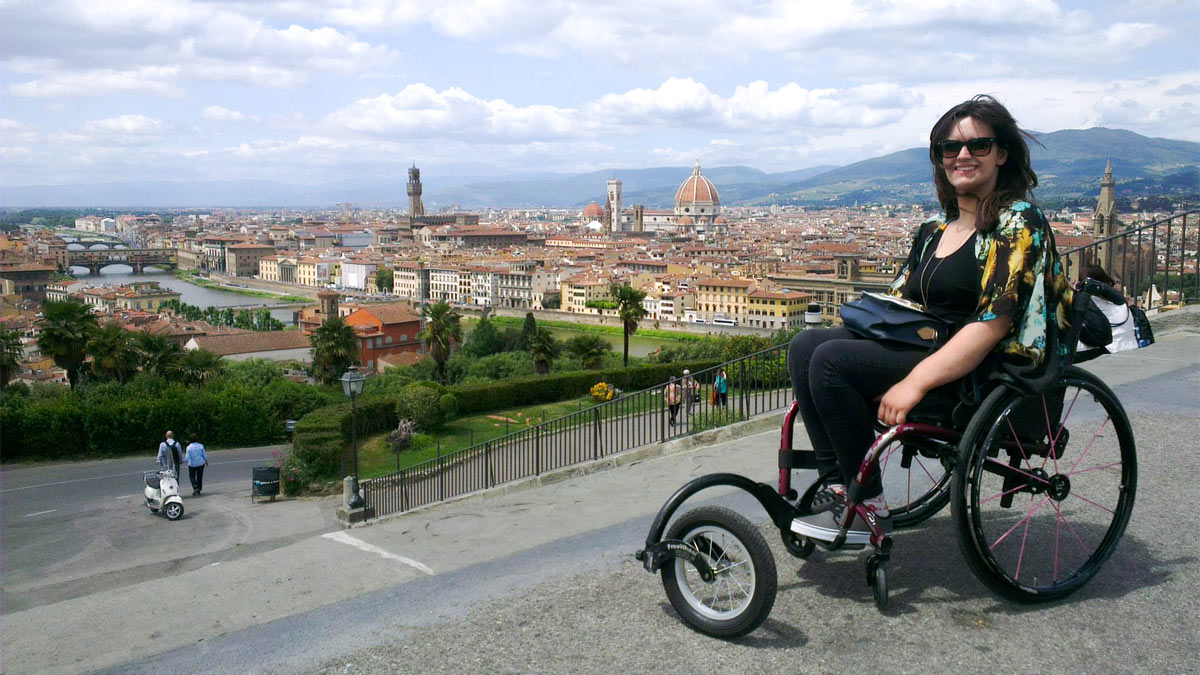The Year Abroad is an exciting opportunity and a valuable experience for Modern Languages students. However, it might appear daunting for someone with a disability. Merryn’s story gives us some top tips about how to plan and, above all, embrace the opportunity.
"For language students, studying abroad is one of the most important parts of our degrees. A year away, absorbing everything another culture has to offer is in equal parts scary and exciting for any student. But then, just over a year before starting university, I became a full-time wheelchair user, so leaving the UK – and all of the physical, emotional and financial safety that it held - would be a challenge. I had so many questions and worries. What would wheelchair access be like? How could I look after myself in a foreign country? Would I have any help navigating new systems and would I even get to enjoy my time away? There was a lot to think about!"
Merryn was studying French and Italian, so she planned to split her year between two countries and, therefore, had twice the preparation.
As she says, “As if the challenge of moving to one country for the year wasn’t enough!”
She was grateful that she had the full support of the Department behind her, including her academic tutor, year-abroad coordinators, and the University of Reading Disability Service.
Merryn has provided the following advice for future students:
Consider your destination
"Do some research on accessibility before you select where you want to go. There are so many factors to consider that can make a place better/worse for access. For me, the most important things were being able to get around easily, being able to access accommodation and, of course, being able to access my lectures.
"It’s worth making a list of wants and needs and doing a bit of googling. A quick search of ‘most accessible towns in France’ told me Grenoble would be a great option for my French studies. It ticked pretty much every box as a town with a fully accessible public transport network, a lively student life and a fully accessible campus university.
"Italy was trickier, but the Department were able to support me with getting information from the available universities, and in the end, I was able to make the decision based on the pros and cons of each option.
"I decided on Florence as it had a small historic centre which would be easier to navigate than somewhere like Rome or Naples. Also, a big cohort of Reading students based in Florence would provide a good support network if required."
Plan accommodation early
"This was the most stressful part of the whole year abroad, mainly because I was super disorganised and left finding accommodation scarily late. France and Italy shut down in August, so trying to do anything last minute was very stressful. But everything will feel easier once you have somewhere to call home.
"Avoid my mistakes and leave plenty of time. My panicked phone calls to the Department were met with a huge amount of support, and I was allocated a fully accessible ensuite room in a shared flat on campus in Grenoble just days before I arrived.
"For the Italian leg, there was no accessible university accommodation available, so I decided to find somewhere when I got there. Using a student flat hunting website, I eventually found a small flat in the centre of town that just about met my needs. Again, I would recommend finding somewhere earlier and even potentially planning a flat-hunting trip before moving to avoid the stress of starting term living in a hostel."

